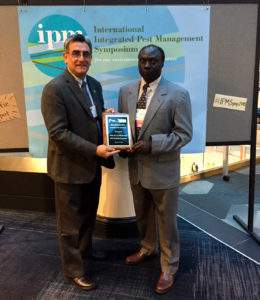
The International Potato Center (CIP for its acronym in Spanish) was recognized with an International IPM Award of Excellence at the 9th International Symposium on Pest Management in Baltimore, Maryland. In the early 1990s, CIP Integrated Pest Management and plant pathology team recognized the need to take a farmer-centric approach to curb the devastating losses in potato yields from late blight infestations.
Partial or complete crop loss can be catastrophic for smallholder farmers who rely on seasonal crop yields to nourish their families in the pre-harvest lean months. While fungicides are one way to manage Late Blight (LB) in potato, it is often cost-prohibitive for cash-strapped farmers. An additional barrier farmers face in LB management is access to information and technology to help making decisions on management technologies to mitigate the impact of the disease.
CIP understood that scientific innovation alone, for example the development of new potato varieties with resistance to LB, would not minimize infestations and increase farmer crop yields. To improve the lives of smallholder farmers, information, and technology needed to be readily available to farmers in a language and context that facilitates their learning of relatively complex concepts related to the integrated management of potato LB (IPM-LB).
Working with research and development organizations (government and NGO) partners, across three continents in Bangladesh, China, Ethiopia, Uganda, Bolivia, Ecuador, and Peru, and with the financial support of the International Fund for Agricultural Development (IFAD) primarily, CIP worked to develop farmer discovery-based learning methods. This method was a two-pronged approach that looked to make the principles of LB management more visible and understandable for farmers and to test LB management options with a focus on new potato clones with resistance to the disease. Farmer Field Schools, a group-based learning approach, were adapted to facilitate farmers’ access to information, knowledge, and technologies.
A series of Farmer Field School-Integrated Pest Management manuals were developed and published and used to train and conduct participatory research with farmers. Based on the experience, several FFS-IPM-LB manuals were developed, published and used to train and conduct participatory research with farmers. Results indicated that farmers learned new knowledge, assessed new potato clones (some of which became formal varieties), and other management options in a participatory way. Adoption was reflected in 32% average increase in potato productivity and income in Peru, and similar changes occurred in the other countries.
Putting farmers’ needs, goals, and challenges at the heart of our research has become a model for researchers of other crops to follow. The pioneering work of CIP has supported methodological innovation by other organizations. For example, between 2005 and 2012 an estimated 1,500 Farmer Field Schools have been implemented focusing on integrated pest and crop management for such diverse food sources as coffee, cocoa, fruit trees, and livestock in Peru. In Uganda and Ethiopia CIP’s initial work with potato FFS has evolved to include seed management, and blossomed into the formation of seed cooperatives. The participatory research and training approach continues to be used in diverse crops, topics, and countries. CIP is about to start another FFS-related project in Malawi with a focus on integrated, multi-crop and livestock management..
“It’s an honor to be recognized by the greater IPM scientific community with this award on behalf of the twelve organizations who participated in the project,” says Deputy Director General for Research, Dr. Oscar Ortiz, who attended the symposium. “Successful farmer adoption of agricultural technology, crop varieties, and practices, requires taking time to truly understand farmers and their current needs, preferences, and goals. It is in working together with government organizations, NGOs, other research organizations and the farmers themselves that we can develop viable solutions that improve the livelihoods of smallholders worldwide. We all have much to learn from one another and improve the overall agricultural innovation systems in developing countries.”
CIP would like to acknowledge our partners who were instrumental in helping to develop this approach: in Peru CARE and local Universities, in Bolivia the PROINPA Foundation, and ASAR, in Ecuador INIAP, in Uganda NARO and AFRICARE, in Ethiopia EIAR and SHDI, in Bangladesh the Tuber Crop Research Center and CARE), and in China the Chongqing Plant Protection Institute, and of course across all these countries and continents the farmers we serve. And also the very valuable financial support that came primarily from IFAD.
To learn more about our approach:
Insights into potato innovation systems in Bolivia, Ethiopia, Peru and Uganda
